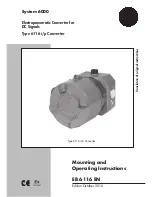
9
General Precautions (cont’d)
Work Area
•
Keep your work area clean and well lit. Cluttered benches and dark areas invite accidents.
•
Do not operate power tools in explosive atmospheres, such as in the presence of flammable
liquids, gases, or dust. Generators create sparks which may ignite the dust or fumes.
•
Keep bystanders, children, and visitors away while operating a generator. Provide barriers or
shields as needed.
Electrical Safety
•
Grounded tools must be plugged into an outlet properly installed and
grounded in accordance with all codes and ordinances. Never remove the
grounding prong or modify the plug in any way. Do not use any adapter
plugs.
•
Grounding provides a low-resistance path to carry electricity away from the
user in the event of an electrical malfunction.
•
Double insulated tools are equipped with a polarized plug where one blade is wider than the
other. This plug fits in a polarized outlet only one way. If the plug does not fit fully in the outlet,
reverse the plug. If it still does not fit, contact a qualified electrician to install a polarized outlet.
Do not change the plug in any way. Double insulation eliminates the need for the three-wire
grounded power cord and grounded power supply system.
•
Avoid body contact with grounded surfaces such as pipes, radiators, ranges, and refrigerators.
There is an increased risk of electric shock if your body is grounded.
•
Do not expose generator to rain or wet conditions. Water entering a generator will increase the
risk of electric shock.
•
Do not abuse the power cord. Keep power cords away from heat, oil, sharp edges, or moving
parts. Replace damaged power cords immediately. Damaged power cords increase the risk of
electric shock.
•
When operating a power tool outside, use an outdoor extension cord marked “W-A” or “W”.
These extension cords are rated for outdoor use, and reduce the risk of electric shock.
Owner’s Manual











































